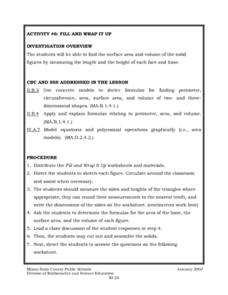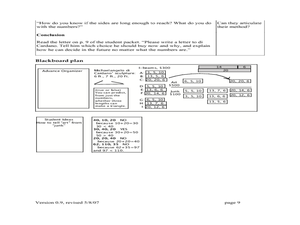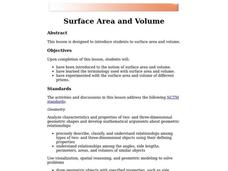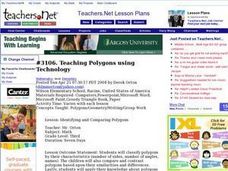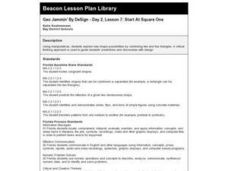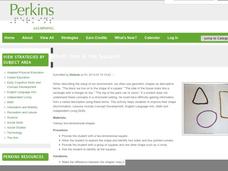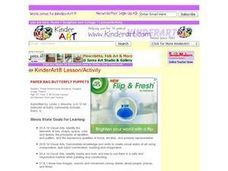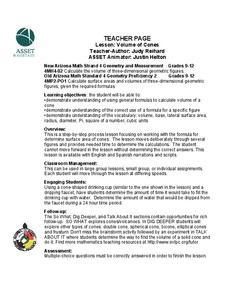Curated OER
Finding Polygons in Cubist Art
Fourth graders explore geometric properties and relationships in a two-dimensional work of art. They first search for and identify polygons in a Cubist painting and then use polygons to create their own Cubist portrait of a classmate.
Curated OER
Pyramids & Prisms: Guler's Formula
Sixth graders compare and contrast two-dimensional shapes to three-dimensional shapes. After watching a demonstration, they make their own shapes using nets printed on paper. To end the lesson, they use the shapes they made and...
Curated OER
Fill and Wrap It Up
Students find the surface area and volume of the solid figures by measuring the length and the height of each face and base. They use concrete models to derive formulas for finding perimeter, circumference, area, surface area, and volume...
Curated OER
Cap-It to the Max
Eighth graders compare the volume of three cylinders constructed from the same size sheet of paper. They use concrete and graphical models to derive formulas for finding perimeter, circumference, area, and volume of two and three...
Curated OER
Art or Junk? Discovering the Triangle Inequality
Middle schoolers study the triangle inequality. They will identify, compare, and analyze attributes of two and three-dimensional shapes. Then they develop vocabulary to describe the attributes. They also use manipulatives to analyze the...
Curated OER
Surface Area and Volume
Students are introduced to the notion of surface area and volume. Students review surface area and volume by finding the area of a two-dimensional shape. They practice using the computer to create different surface area shapes.
Curated OER
Graphs, Three-Dimensional Coordinates
In this three-dimensional graphing activity students identify the coordinates of the vertex of shown figures. The first three shapes show all answers. The following 8 shapes are on coordinate dot paper, with all three axis shown and...
Curated OER
GEOMETRY UNIT
High schoolers, through investigation facilitated by dynamic geometry software, determine geometric properties and relationships involving two-dimensional shapes, and apply the results to solving problems.
Curated OER
Math 212: Planes
In this plane worksheet, students find the midpoint of a line, determine points on a plane, and use the cross product to find an equation with given parameters. This two-page worksheet contains three problems.
AIMS Education Foundation
Shifty Shapes
Shape shifters examine and experiment with pattern shapes. In this geometry lesson, they work in groups to name and describe pattern block shapes, and they discover the combinations of shapes that can be placed inside a hexagon.
Curated OER
Teaching Polygons using Technology
Third graders utilize different types of computer programs, such as Microsoft paint and Microsoft Word to study and create different types of polygons. They use PowerPoint to create a story about a shape and others that it meets during a...
Think Map
Know Your Polygons!
Shape shifters recognize characteristics of polygons. Embracing language arts skills in addition to math, they use a thesaurus to pinpoint specific attributes of a set of polygons. They also participate in a 21-question guessing game...
Curated OER
Geo Jammin' By DeSign - Day 2, Lesson 7: Start At Square One
Students examine new shape possibilities by combining two and four triangles using manipulatives.
Curated OER
Symmetry of Flags
High schoolers explore, examine and study the symmetry of the flags of individual countries in the EU. They identify and describe the reflection and rotation symmetries of two-dimensional shapes and assess how symmetry changes with...
K12 Reader
3-D: It’s Not Just for Movies
This two-part reading comprehension exercise asks kids to read a short passage about cubes, rectangular prisms, spheres and pyramids, and then to respond to a series of questions about the article.
Alabama Learning Exchange
Twisted Tangrams
Primary geometers create a picture using tangrams. In this geometry lesson, students read Grandfather Tang: A Tale Told with Tangrams, cut out their own tangrams, and choose a character from the story to make using their tangram pieces.
Perkins School for the Blind
Which One is the Square?
Children who are blind need to constantly be engaged in building conceptual understandings of the world around them. This activity will help them grasp the concept of shape, identify shapes, and consider shapes as they are used to...
National Gallery of Canada
To Canada with Love
Focus on line and color with a postcard project. Learners view various works of art and discuss line and color before moving on to creating their own work. Using nature as inspiration, pupils decorate postcards and mail them after...
K-5 Math Teaching Resources
Dot Paper
In need of some dot paper for your next geometry lesson? Then look no further. This simple template allows you to maintain a classroom supply of this special paper for whenever the need arises.
Curated OER
Paper Bag Butterfly Puppets
Whether you're using it to tell stories, explore the letter b, or during a life science lesson plan, these butterfly puppets will be a hit. Youngsters use crayons, tissue paper, and paper bags to create butterfly puppets.
Curated OER
What's My Rule for Sorting?
Students view objects sorted by one characteristic and name that characteristic. In this sorting rule lesson, students explore to find a new characteristic and write a description of that rule. In early grades the rule might...
Curated OER
A Cone and Its Net
Create and investigate nets for solid shapes with your class. They identify the different parts and faces of each polygon and solid then calculate the surface area and volume of cones. They use circle sectors of varying sizes to build...
Futures Channel
Folding Circles
Students investigate properties of circles. In this geometry activity, students differentiate between similarity and congruence as they observe polygons. They investigate properties of two and three dimensional shape.
Curated OER
Volume of Cones
Young scholars identify the volume of cones and pyramids. In this geometry lesson, students derive the formula for cones and pyramids. They calculate the volume of cones and other three dimensional shapes.
Other popular searches
- Two Dimensional Shapes
- Sorting 2 Dimensional Shapes
- Two Dimensional Shapes
- Identify 2 Dimensional Shapes
- Math Two Dimensional Shapes
- Two Dimensional Shapes Plan
- Analyze 2 Dimensional Shapes
- Area Two Dimensional Shapes
- Two Three Dimensional Shapes
- Math 2 Dimensional Shapes
- Two Dimensional Shapes


